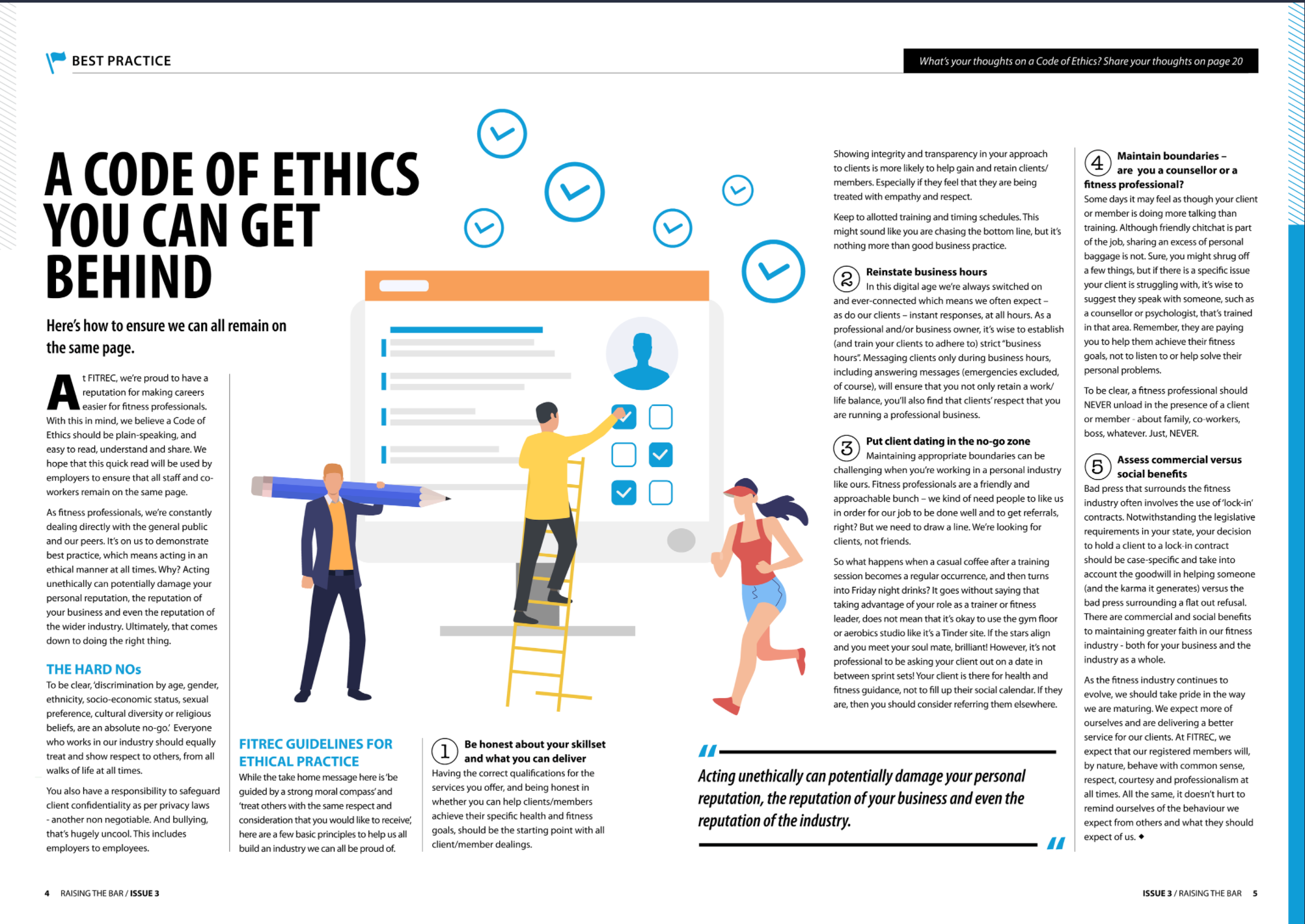A Code of Ethics You Can get behind

The article 'A Code of Ethics You Can Get Behind' first appeared in Issue 3 of FITREC's quarterly 'Raising the Bar' magazine.
A CODE OF ETHICS YOU CAN GET BEHIND
Here's how to ensure we all remain on the same page.
At FITREC, we’re proud to have a reputation for making careers easier for fitness professionals. With this in mind, we believe a Code of Ethics should be plain-speaking, and easy to read, understand and share. We hope that this quick read will be used by employers to ensure that all staff and coworkers remain on the same page.
As fitness professionals, we’re constantly dealing directly with the general public and our peers. It’s on us to demonstrate best practice, which means acting in an ethical manner at all times. Why? Acting unethically can potentially damage your personal reputation, the reputation of your business and even the reputation of the wider industry. Ultimately, that comes down to doing the right thing.
THE HARD NOs
To be clear, ‘discrimination by age, gender, ethnicity, socio-economic status, sexual preference, cultural diversity or religious beliefs, are an absolute no-go.’ Everyone who works in our industry should equally treat and show respect to others, from all walks of life at all times.
You also have a responsibility to safeguard client confidentiality as per privacy laws - another non-negotiable. And bullying, that’s hugely uncool. This includes employers to employees.
FITREC GUIDELINES FOR ETHICAL PRACTICE
While the take-home message here is ‘be guided by a strong moral compass’ and ‘treat others with the same respect and consideration that you would like to receive’, here are a few basic principles to help us all build an industry we can all be proud of.
1. Be honest about your skillset and what you can deliver.
Having the correct qualifications for the services you offer, and being honest in whether you can help clients/members achieve their specific health and fitness goals, should be the starting point with all client/member dealings.
Showing integrity and transparency in your approach to clients is more likely to help gain and retain clients/members. Especially if they feel that they are being treated with empathy and respect. Keep to allotted training and timing schedules. This might sound like you are chasing the bottom line, but it’s nothing more than good business practice.
2 Reinstate business hours.
In this digital age we’re always switched on and ever-connected which means we often expect –as do our clients – instant responses, at all hours. As a professional and/or business owner, it’s wise to establish (and train your clients to adhere to) strict “business hours”. Messaging clients only during business hours, including answering messages (emergencies excluded, of course), will ensure that you not only retain a work/life balance, you’ll also find that clients’ respect that you are running a professional business.
3 Put client dating in the no-go zone
Maintaining appropriate boundaries can be challenging when you’re working in a personal industry like ours. Fitness professionals are a friendly and approachable bunch – we kind of need people to like us in order for our job to be done well and to get referrals, right? But we need to draw a line. We’re looking for clients, not friends.
So what happens when a casual coffee after a training session becomes a regular occurrence, and then turns into Friday night drinks? It goes without saying that taking advantage of your role as a trainer or fitness leader, does not mean that it’s okay to use the gym floor or aerobics studio like it’s a Tinder site. If the stars align and you meet your soul mate, brilliant! However, it’s not professional to be asking your client out on a date in between sprint sets! Your client is there for health and fitness guidance, not to fill up their social calendar. If they are, then you should consider referring them elsewhere.
4 Maintain boundaries – are you a counsellor or a fitness professional?
Some days it may feel as though your client or member is doing more talking than training. Although friendly chitchat is part of the job, sharing an excess of personal baggage is not. Sure, you might shrug off a few things, but if there is a specific issue your client is struggling with, it’s wise to suggest they speak with someone, such as a counsellor or psychologist, that’s trained in that area. Remember, they are paying you to help them achieve their fitness goals, not to listen to or help solve their personal problems.
To be clear, a fitness professional should NEVER unload in the presence of a client or member - about family, co-workers, boss, whatever. Just, NEVER.
5 Assess commercial versus social benefits.
Bad press that surrounds the fitness industry often involves the use of ‘lock-in’ contracts. Notwithstanding the legislative requirements in your state, your decision to hold a client to a lock-in contract should be case-specific and take into account the goodwill in helping someone (and the karma it generates) versus the bad press surrounding a flat out refusal. There are commercial and social benefits to maintaining greater faith in our fitness industry - both for your business and the industry as a whole.
As the fitness industry continues to evolve, we should take pride in the way we are maturing. We expect more of ourselves and are delivering a better service for our clients. At FITREC, we expect that our registered members will, by nature, behave with common sense, respect, courtesy and professionalism at all times. All the same, it doesn’t hurt to remind ourselves of the behaviour we expect from others and what they should expect of us.
This article originally appeared in Issue 3 of Raising the Bar FITREC Magazine.
